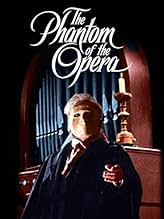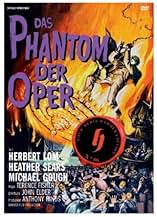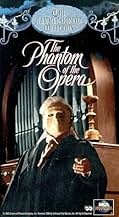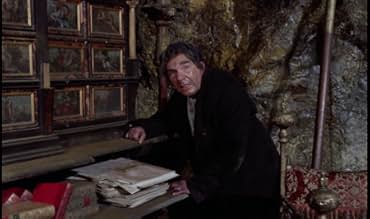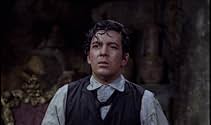IMDb रेटिंग
6.4/10
4 हज़ार
आपकी रेटिंग
अपनी भाषा में प्लॉट जोड़ेंAn acid-scarred composer has his dwarf helper bring an opera singer to his London sewer hide-out.An acid-scarred composer has his dwarf helper bring an opera singer to his London sewer hide-out.An acid-scarred composer has his dwarf helper bring an opera singer to his London sewer hide-out.
- पुरस्कार
- कुल 1 नामांकन
Miriam Karlin
- Charwoman
- (as Miriam Carlin)
फ़ीचर्ड समीक्षाएं
This was one of the best, but it really bothered me that it strayed so far from other versions. It takes place in Victorian London rather than Paris, and the Phantom has a totally different death scene at the end. What happened to the famous "Chandelier" scene? Christine Charles instead of Dae?? Anyway, a very good movie. I'd rate this about an 8 out of 10. Those sets in the underground certaintly look like the original sets from 1925!.
Each "Phantom of the Opera" deviates somewhat from the Leroux novel - with the original silent film with Lon Chaney perhaps being the exception. In the '40s Nelson Eddy version, the police chief and an operatic baritone are Christine's suitors instead of Raoul (though the baritone is named Raoul) and it's hinted that the Phantom is her father. His acid in the face was the result of a misunderstanding at the music publisher's.
In this particular "Phantom," from Hammer Studios, the Phantom (Herbert Lom) has an Igor-type assistant, and here Christine's suitor is the manager of the opera house (Edward de Souza). There is also a real villain, a plagiarist in the form of Lord d'Arcy (Michael Gough). Most notably, it has a production of "Joan of Arc" with music written by Edwin T. Astley that is actually very pretty and beautifully sung.
Everyone does a terrific job in this - Gough is hateful as the supposed composer of the opera; de Souza is a hunk and a good romantic interest for Christine; and Heather Sears as Christine is very sweet and, like all Christines, lacking the diva quality her rival has. In this film, the rival singer is a very minor role. The dubbing of the voices is wonderful.
Herbert Lom, normally a comic character in the "Pink Panther" series, is a great phantom, performed at a time when the Phantom didn't have to be better-looking than the ingénue. The Phantom is not a huge role in this film, but an effective and highly sympathetic one. He seems a little less nuts than some of them, though he's clearly not completely there.
The final scene of this film is very exciting, and the final picture very powerful and sad. This is a really excellent version with not much emphasis on the horror aspects of the Chaney film. It has good production values and is very well directed.
In this particular "Phantom," from Hammer Studios, the Phantom (Herbert Lom) has an Igor-type assistant, and here Christine's suitor is the manager of the opera house (Edward de Souza). There is also a real villain, a plagiarist in the form of Lord d'Arcy (Michael Gough). Most notably, it has a production of "Joan of Arc" with music written by Edwin T. Astley that is actually very pretty and beautifully sung.
Everyone does a terrific job in this - Gough is hateful as the supposed composer of the opera; de Souza is a hunk and a good romantic interest for Christine; and Heather Sears as Christine is very sweet and, like all Christines, lacking the diva quality her rival has. In this film, the rival singer is a very minor role. The dubbing of the voices is wonderful.
Herbert Lom, normally a comic character in the "Pink Panther" series, is a great phantom, performed at a time when the Phantom didn't have to be better-looking than the ingénue. The Phantom is not a huge role in this film, but an effective and highly sympathetic one. He seems a little less nuts than some of them, though he's clearly not completely there.
The final scene of this film is very exciting, and the final picture very powerful and sad. This is a really excellent version with not much emphasis on the horror aspects of the Chaney film. It has good production values and is very well directed.
The novel The Phantom of the Opera has been filmed at least ten times plus now. This entry by Hammer Studios is one of the better ones, bringing a liberal change in storytelling as well as some very atmospheric settings and camera work. Directed by Terence Fisher, this film, like Fisher's The Gorgon, is highly poetic. The phantom is a former music professor who has been pushed into his life of seclusion and physical deformity. He is a figure of sympathetic pity rather than horror. It is this point of view which makes this film very interesting as the phantom is not the monster but rather just a man who has been mistreated trying to cope and resurrect his life. Yep, he still lives in the sewers of Paris. The Hammer sets are wonderful all around, particularly the opera house and the winding underground sewers. Hammer also puts their stamp of luxuriant looking cinematography on. Herbert Lom plays the man behind the mask. Lom does a nice job in the film as do all the leads. Heather Sears is a striking heroine, and Edward Da Souza makes an affable leading man. The real star, apart from Fisher's direction, is Michael Gough. Boy, can this man play a mean individual. Gough's screen time is magic as he malevolently belittles everyone around him, steals things that are not his, and lewdly leers at anything in a skirt! The film also boasts some fine staged opera numbers and a beautiful soundtrack. Many scenes show Fisher's competence and ability to create lush moods whilst being able to provide good storytelling.
A fine Phantom edition.
A fine Phantom edition.
As far as adaptations of The Phantom of the Opera goes(excluding the Andrew Lloyd Webber musical), this 1962 Hammer version is not as good as Lon Chaney's, which is the best version, but it's superior to the Claude Rains version(though I do prefer Rains over Herbert Lom).
It does have its problems, with too much time spent on the opera and the romance and not enough of the Phantom, which does undermine the tension, sense of dread and horror. Sadly, the opera numbers, while musically good, are staged awkwardly and really do slow the film down. The romance is rather saccharine, and the chemistry between the two 'heroes' a little bland. Heather Sears also plays Christine too low-key and the script, while with some intelligent moments, does plod sometimes and has a little too much talk.
However, it is very lavishly made (one of the better looking early-60s Hammer films) with truly marvellous interiors of the opera house, rich vibrant colours and opulent costumes. It is beautifully and spine-chillingly scored, though James Bernard would have been an even better fit for composer. The story is less than perfect, but does offer some effective moments. The close up of the eye is really quite chilling and enough to make one jump, while the grasping hand over the stage and the lowering of the gas lamp are indeed very suspenseful, Phantom's back-story is interesting and makes one empathise with him and the ending is incredibly moving.
Terrence Fisher's direction is technically accomplished and does evoke some suspense and atmosphere, though his story-telling has been better elsewhere. Regarding the acting, Michael Gough steals the show being chillingly vile as a true slimeball with no redeeming qualities of a character. Herbert Lom is a great contrast as the Phantom, under heavy and effective make-up he is a sympathetic and tragic figure and it is quite a poignant performance, though not without a few scary moments. Edward De Souza is charming.
In conclusion, not among the best of Hammer by a long shot and could have been better, but still manages to be pretty good. 7/10 Bethany Cox
It does have its problems, with too much time spent on the opera and the romance and not enough of the Phantom, which does undermine the tension, sense of dread and horror. Sadly, the opera numbers, while musically good, are staged awkwardly and really do slow the film down. The romance is rather saccharine, and the chemistry between the two 'heroes' a little bland. Heather Sears also plays Christine too low-key and the script, while with some intelligent moments, does plod sometimes and has a little too much talk.
However, it is very lavishly made (one of the better looking early-60s Hammer films) with truly marvellous interiors of the opera house, rich vibrant colours and opulent costumes. It is beautifully and spine-chillingly scored, though James Bernard would have been an even better fit for composer. The story is less than perfect, but does offer some effective moments. The close up of the eye is really quite chilling and enough to make one jump, while the grasping hand over the stage and the lowering of the gas lamp are indeed very suspenseful, Phantom's back-story is interesting and makes one empathise with him and the ending is incredibly moving.
Terrence Fisher's direction is technically accomplished and does evoke some suspense and atmosphere, though his story-telling has been better elsewhere. Regarding the acting, Michael Gough steals the show being chillingly vile as a true slimeball with no redeeming qualities of a character. Herbert Lom is a great contrast as the Phantom, under heavy and effective make-up he is a sympathetic and tragic figure and it is quite a poignant performance, though not without a few scary moments. Edward De Souza is charming.
In conclusion, not among the best of Hammer by a long shot and could have been better, but still manages to be pretty good. 7/10 Bethany Cox
I really enjoyed this film here. It was a great horror film and not that bad as a Phantom movie. Although The Phantoms real name in this one is not Erick as it should be, The Pasrt was played very well by Herbert Lom and i really liked it that they had the Phantom play the fuleral march in this one. The mask on the Phantom was really cool it was the full face mask and i like that. In some of the more recenlt Phantom films he has not ever had the mask (as in the 1999 version with Julian Sands and the 1989 big budget film with Robert Englund)All in all this movie is really good and if you are a fan of Gothic horror films then you will like this one this has a gothic setting to it that i liked. I give this movie a 8 out of 10. Done very well for it's time
क्या आपको पता है
- ट्रिवियाThe "London Opera House" used here is actually the Wimbledon Theatre.
- गूफ़A boom crane is visible in Christine's dressing room mirror briefly when the Phantom first speaks to her.
- भाव
Harry Hunter: What I don't understand is how Ambrose d'Arcy can write so much excellent music in the last few years when he has so little musical taste.
- इसके अलावा अन्य वर्जनThe UK cinema version was cut by the BBFC for an 'A' (PG) certificate and edited the eye-stabbing of the rat-catcher and shots of a hanging body, as well as extensive edits to scenes showing the creation and final unmasking of the Phantom. Later video and DVD releases were uncut.
- कनेक्शनFeatured in The Movie Orgy (1968)
- साउंडट्रैकJoan of Arc
by Edwin Astley
टॉप पसंद
रेटिंग देने के लिए साइन-इन करें और वैयक्तिकृत सुझावों के लिए वॉचलिस्ट करें
विवरण
- रिलीज़ की तारीख़
- कंट्री ऑफ़ ओरिजिन
- भाषा
- इस रूप में भी जाना जाता है
- El fantasma de la ópera
- फ़िल्माने की जगहें
- New Wimbledon Theatre, The Broadway, Wimbledon, लंदन, इंग्लैंड, यूनाइटेड किंगडम(Theatre Auditorium Interiors)
- उत्पादन कंपनी
- IMDbPro पर और कंपनी क्रेडिट देखें
बॉक्स ऑफ़िस
- बजट
- £1,80,000(अनुमानित)
- चलने की अवधि1 घंटा 30 मिनट
- पक्ष अनुपात
- 1.66 : 1
इस पेज में योगदान दें
किसी बदलाव का सुझाव दें या अनुपलब्ध कॉन्टेंट जोड़ें


